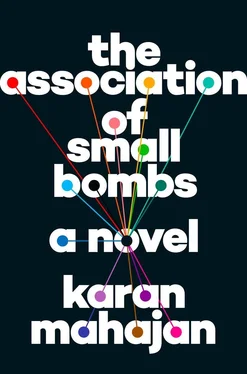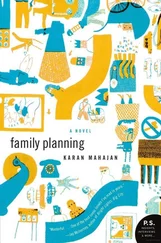“Their classmates remember them too.” The Khurana boys and he had been in different schools. This was one reason they were friends. Mansoor, when he saw them, was free from the baggage of reputation that attached itself to him in school, where he was taunted for being a Muslim, dubbed “mullah” and “Paki” and “mosquito.”
“But you should go,” his mother had said. “Do your duty. Don’t worry about the outcome. When you lose someone, you think of them all the time anyway. You’ll change nothing. You’ll make them feel less alone, less crazy.”
Mansoor remembered this now and yet felt uncomfortable. “Auntie, I should go home — Mummy likes eating dinner early,” he said in the dusty drawing room, the walls shaking from renovation and construction happening elsewhere. Mansoor knew the sounds so well from years of living in Delhi that he could picture the machines — large cement mixers and pile drivers. Delhi has no bird-watchers, only machine-listeners.
“No, no, stay a little while more,” she said. Now he’d made her feel guilty about crying. Fuck.
Pulling back her graying hair, she brought out a photo album with a dizzying fluorescent green and maroon cover. “Here are pictures of you and the boys at the Sports Day in Maharani Bagh,” she said, opening to a plastic page with two photos jammed at sad angles inside it. But her eyes were blurry; she left the pictures open too long; she was lost.
When Mansoor was leaving, Vikas Uncle said, “I want to give you something.” They went to the bathroom together. This was Vikas Uncle’s studio, a space that had been converted after the boys’ deaths — what was the use, after all, of two toilets? Above, water bled gauntly through the pipes, and notebooks lay in an abject circle on the floor around the toilet column. The bathing area was a chaos of equipment — black pieces of angled metal, tripods, cameras in their plastic hoods. From this pile Vikas Uncle fished out a bulky Minolta camera with a silver focus. “I’d kept it for the boys,” he said. “But I want you to have it.”
“No, uncle. Where will I use it?”
“Take it,” he said. “I know digital is in fashion these days, but the quality you can get from this is unparalleled. I’ve photographed some very beautiful ladies with this camera, when I was doing shoots for Cosmo .”
________
Mansoor had seen Vikas Uncle’s movies before and had never cared for them. They were serious, stiff, shot in black-and-white, the characters speaking crisp English. Nothing good happened to anyone. People lived enclosed middle-class lives, taunting each other with petty memories, and women and men argued incessantly. “They’re so joyless,” he had told his mother, wondering at how tragic Vikas Uncle’s sensibility had been even before the blast — it was as if he were sitting at a ceremonial fire, fanning a tragedy toward himself.
“But they are very acclaimed,” his mother had said reverently.
________
“They gave you another thing?” his mother said when he came home. “They shouldn’t have. Anyway, their finances aren’t so good. Deepa was saying that these days, because there’s a new distribution system, it’s very difficult to get financing for art films.”
“I’m so old now,” Mansoor said, which was neither here nor there.
“Let me keep it,” she said, taking the camera from him.
He knew what would happen — it would disappear, like all the things Vikas Uncle had given him over the years. His mother had immense empathy for the Khuranas, but like so many people, she was superstitious about death, cautious about not letting it sneak into her house.
Now, for the first time as an adult, Mansoor became curious about the Lajpat Nagar case. Then one day, on the way back from physio, having read in the newspaper that a hearing was scheduled in Patiala House, he directed the driver to take him to the court.
Mansoor had never been to the courts before — those barracks of Indian life crammed behind the colonial facades of Lutyens’s Delhi — but he had a chacha who was a lawyer and had heard a great deal about the institution. When his parents rang him on his mobile, he silenced it. He wanted time to himself.
He got out of the car and, after lightly acknowledging the guard at the entrance, walked through the open bricked corridors with their searching blind fingers of dead trees, their groggy supplicants in red and white sweaters. Through his swimming nervous vision he saw signs indicating the names of the courtrooms. Finally, he entered a courtroom the size of a classroom. At the front of the room, two lawyers in their penguinlike garb, their backs turned to the audience, were murmuring to the judge, who bent his head down from his high boatlike desk. When Mansoor sat down in the last row, his wrists almost spiritual with pain, one of the lawyers twisted around for a second and then went back to talking. A few moments later, several hassled-looking men with sweat-soaked shirts appeared at the door, carrying what seemed to be a Chinese changing screen, the type behind which naked women are always banished in old movies. Now the lawyers turned around completely. The men began to set up the screen near the front of the room.
“The proceeding is in camera,” the judge said suddenly.
There was a commotion and throat-clearing in the aisles next to Mansoor.
“In camera,” he repeated, irritated.
People began to rise.
“You have to get up,” a woman in a smart pantsuit instructed Mansoor.
Perplexed, having exited, Mansoor lingered now by the tea stall outside the Sessions Court, watching the dhaba-wallah fry samosas in a deep wok. He was in a philosophical mood, thinking back to the stories the Khuranas had told about the adjournments.
“You good name?” a voice interrupted him.
Mansoor turned around to see himself facing a man with a squashed, eager look about him; a neckless fellow with crooked teeth bejeweling his gums. Mansoor recognized him from the courtroom.
Mansoor mumbled, “Hello.”
“My name is Naushad,” the man said quickly, placing a palm on his chest. “I work for an NGO, Peace For All.” Peace For All, according to Naushad, focused on “communal harmony” and was looking to provide a just, speedy trial for the men arrested for the 1996 blast. “You’re a journalist?” he asked Mansoor.
“No, no — just a visitor,” Mansoor said, smiling slightly, now understanding the reason for his forwardness.
“You have a relative in the case?” Naushad asked in Hindi.
“No.” Mansoor smiled again. He crushed the paper cup and chucked it into a bin, where it parachuted into a ridge between other crushed cups. “I just wanted to watch. Anyone can come. But I should go.”
“But people don’t really come just like that — that’s why I was asking. But you’re a Muslim, no?”
“Yes,” Mansoor said, amazed at this religious clairvoyance. But he was gifted with it too; he had somehow known Naushad was a Muslim before he announced his name. “Actually I was a victim of the blast,” Mansoor said. “But I don’t have any connection with the case.”
“ You were injured in the blast?” Naushad said, pointing a finger down at the ground in surprise.
Mansoor nodded. “I was small. But I got shrapnel in my arm.”
At that moment, Mansoor felt he had pulled out a trump card; that he had absolved himself of suspicion in the eyes of the dhaba-wallah, who had been listening to the exchange in an absent way; sopping up the conversation the way his samosas were sopping up oil.
“Don’t take this the wrong way,” Naushad said, clearly excited. “But you can really help us.” He launched into an explanation. “We’ve been working for two or three years for people to give attention to the locked-up men. Everyone knows — even the judges — that the wrong men have been arrested. You can read it in the documents: there was no independent witness present when they were arrested. That’s why they keep adjourning. But the issue is that after 9/11 and the Parliament attack, no one wants to help these people. ‘They’re bloody terrorists; let them rot,’ they say. But, bhai, they haven’t even been proven to be terrorists! One is a papier-mâché artisan. Another was a student in class eight when he came to Delhi to stay with his brothers. And the last one, he used to work with his family in a carpet shop in Kathmandu. These people’s lives have been ruined, and now six years have passed without a trial. So we’re making an effort to bring out the story in the press. And look, if someone like you, an educated person, a victim — if you say something, imagine how much more of a difference it’ll make. Let me write my name and e-mail and phone on a chit”—he had already taken out a tattered lined paper and was pressing a pen into it against a timber column in the tea shop—“and if you want to help please phone us or e-mail us. Here you go.” He handed Mansoor the chit. “As salaam aleikum,” he said.
Читать дальше












